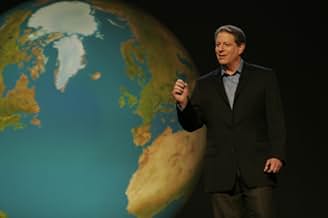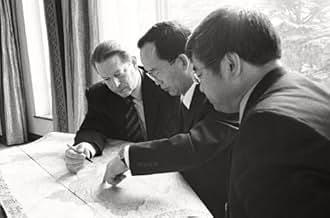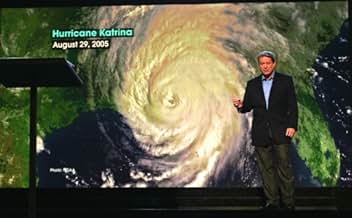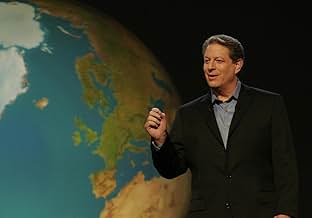Filmemacher Davis Guggenheim dokumentiert Al Gores Vortragsreise, auf der der frühere Präsidentschaftskandidat sich dafür einsetzt, das öffentliche Bewusstsein für die Gefahren der globalen ... Alles lesenFilmemacher Davis Guggenheim dokumentiert Al Gores Vortragsreise, auf der der frühere Präsidentschaftskandidat sich dafür einsetzt, das öffentliche Bewusstsein für die Gefahren der globalen Erwärmung zu schärfen, und sofortige Maßnahmen fordert, die deren zerstörerische Auswirkun... Alles lesenFilmemacher Davis Guggenheim dokumentiert Al Gores Vortragsreise, auf der der frühere Präsidentschaftskandidat sich dafür einsetzt, das öffentliche Bewusstsein für die Gefahren der globalen Erwärmung zu schärfen, und sofortige Maßnahmen fordert, die deren zerstörerische Auswirkungen auf die Umwelt eindämmen sollen.
- 2 Oscars gewonnen
- 34 Gewinne & 11 Nominierungen insgesamt
- Self
- (Archivfilmmaterial)
- (Nicht genannt)
- Self
- (Archivfilmmaterial)
- (Nicht genannt)
- Self
- (Archivfilmmaterial)
- (Nicht genannt)
Empfohlene Bewertungen
The analogies he draws, his call for action and most importantly his passion for environment come across clearly.
Even more so, we understand Al Gore himself as a son, a brother, a father and most of all a human being who cannot just sit there and watch his neighbor's house burn !
As a movie, I would rate it as 'worth a watch' and 'worth telling your movie-buffet buddies about'.
Despite all this, the absence of something caught my eye. Al Gore explains all his charts and data very well...
.. but when he shows this particular chart that has the temperature-CO2 levels projected over the last 600,000 year time line, he only shows how high the 'current CO2 levels' are compared to any other time in this span!
At this point, I was really curious to know how the temperature changed with respect to it in recent years and if it still adhered to the previous 'cyclical limits' but he does not display that data or even attempt to project future estimates!
May be a convenient omission? I have not seen this data anywhere else but if one of you come across that last piece of information missing in the movie, can you please post it here?
When Bush came to power, the project was dismantled by Cheney who as Secretary of Defense fought the establishment of Medea. The results were buried and denied and Bush went on record saying that climate change was a hoax. (Both he and McCain now admit that climate change is occurring but that we need to "be deliberate" and "cost effective" in responding. You know what that means.)
Some of the material from Medea is used in this movie: the Arctic Ice Cap thickness survey, but if Gore (who was briefed at the time) could have used that larger material, his case would have been even stronger. It is strong enough, despite a few unnecessarily dramatic photographic effects that bend the context here and there. That classified science might not have made for a cinematic presentation because much of it deals with extinction-scale pandemics.
The presentation program used here is KeyNote, Apple's competitor to Microsoft's PowerPoint. Its worth noting that it is a very snazzy product. Apparently much of the design from that period came from the wishes of Gore for this project and the demands of Steve Jobs for his own keynote speeches. Its a great story by itself.
In terms of narrative construction, there are two stories here. One is the story of the collapse of the Earth's weather system. Frankly, I think he could have done a better job on this. The science is complex but overwhelming. But it does not lend itself well to pictures or simple predictions.
To make this palatable, you need a wrapper story, a framing narrative. What's refreshing about this is that the usual choice wasn't made: to focus on the "conspiracy" of climate change deniers, a couple of outlier scientists and a passel of industry groups and ideologue political organizations. Instead, they chose to wrap the slideshow with a story of redemptive idealism about the presenter. I think it works, but it carries baggage.
About two fifths of the electorate voted against this guy, and many of those did because they preferred a different myth, a different story. That's a pretty heavy burden to overcome if what you want to do is lubricate the essential message. I had only a little trouble with it because I know how truly earnest he is. But earnestness and dedication isn't science, and facts, truth is supposed to be the issue at core.
You cannot be successful in advertising that with personal voyages and memories.
But so far as the slide show. Its definitely worth watching.
Ted's Evaluation -- 3 of 3: Worth watching.
So, you don't put it on PBS or a basic cable channel. First you made everyone get in their car and DRIVE to a theater and PAY to see this crucial information. Then, if they missed it at the theater, now then can buy this crucial information (but not until Nov. 21st).
This is nothing more than a fancy documentary. But you gave it a premier like a movie, ran it in movie theaters (with movie prices), held it for DVD release like a movie. What gives Al Gore? If it can be held for months for DVD release or not shown for free, than I guess it can't be too damned important.
As I said, a very good educational film. The problems come in the short but noticeable periods when the film tries to be a biography of Al Gore at the same time. Now, I don't know about you, but I was watching this to find out about global warming, not to find out what Al Gore thought about losing the 2000 election. I imagine that these are the bits that teachers will fast-forward over when they show this to their classes, since they don't really add anything to the film. I would have respected Al Gore a bit more if he hadn't tried to make this a film also (in a way) about himself. I guess it's to be expected, since he's a politician, but it's disappointing.
In closing, although it's not a perfect film, it's a pretty good one. It is THE film to watch if you want to find out about global warming (at least, I haven't heard of any better films out there). I don't really understand all of the "10" or "1" ratings on IMDb. It's not a "10" or "1" film. Even its biggest fans will have to admit that as a movie it could be a little tighter sometimes. I think it's good enough, but it's not perfect.
Wusstest du schon
- WissenswertesThe DVD case in which the film is packaged is made from 100% recycled cardboard.
- Crazy CreditsThe closing credits are interleaved with tips on reducing your own carbon footprint.
- VerbindungenEdited into De wereld draait door: Folge #5.96 (2010)
- SoundtracksI Need to Wake Up
Performed by Melissa Etheridge
Music and Lyric by Melissa Etheridge
Produced by Melissa Etheridge and David Cole
©2006 Songs of Ridge Road (ASCAP)
Courtesy of The Island Def Jam Music Group
Top-Auswahl
Details
Box Office
- Budget
- 1.500.000 $ (geschätzt)
- Bruttoertrag in den USA und Kanada
- 24.146.161 $
- Eröffnungswochenende in den USA und in Kanada
- 281.330 $
- 28. Mai 2006
- Weltweiter Bruttoertrag
- 49.782.012 $
- Laufzeit1 Stunde 36 Minuten
- Farbe
- Sound-Mix
- Seitenverhältnis
- 1.78 : 1
Zu dieser Seite beitragen
































